Introduction: In this article – to help celebrate February being Black History Month – Mary Harrell-Sesniak searches old newspapers to learn more about publisher, journalist and abolitionist John Brown Russwurm. Mary is a genealogist, author and editor with a strong technology background.
Newspapers are one of the most important resources for expanding genealogical data and filling in your family tree. Often when searching newspapers, we find long-lost articles and advertisements that fill in the blanks on what came before.
To illustrate this important point and also to celebrate February as Black History Month, let’s search GenealogyBank’s Historical Newspaper Archives to take a look at a man recognized by many as one of the top 100 historical African Americans: publisher, journalist and abolitionist John Brown Russwurm.
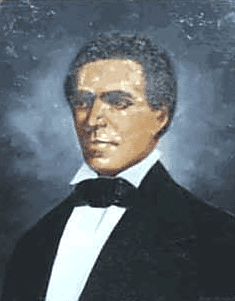
Born in Jamaica
Born in Jamaica in 1799, John Brown Russwurm’s father was an English merchant – his mother was a black slave whose name has been lost to history. In 1812, his father moved to Portland, Maine, and brought John with him.
The First African American to Graduate from Bowdoin College
John Brown Russwurm graduated from Bowdoin College in Maine in 1826. As the first African American to graduate from Bowdoin – and the third African American to graduate from any American college – his accomplishment was duly noted in several papers.
This Maine newspaper reports: “At the late commencement at Bowdoin College the following young gentlemen received the degree of Bachelor of Arts,” listing John B. Russwurm as one of the 28 graduates. The article also listed the “Order of Exercises” – the second speaker, right after the “Salutatory Oration in Latin,” was Russwurm, presenting a treatise on “The Condition and Prospects of Hayti [Haiti].”
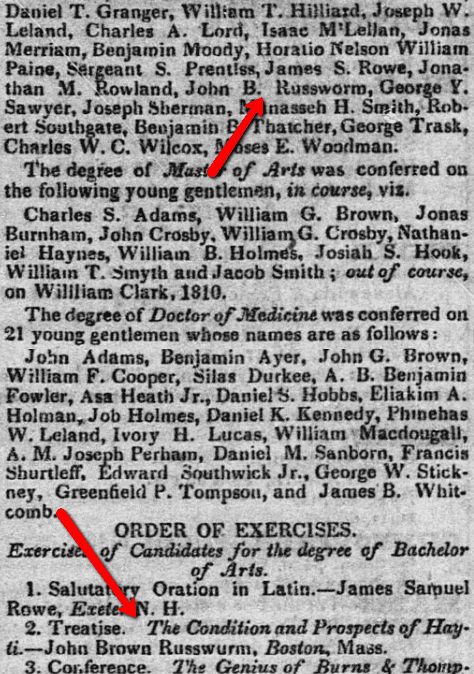
This Connecticut newspaper says of Russwurm’s commencement address that day:
“He came on the stage under an evident feeling of embarrassment, but finding the sympathies of the audience in his favor, he recovered his courage as he proceeded. He pronounced his part in a full and manly tone of voice, accompanied with appropriate gestures, and it was received by the audience with hearty applause. Altogether it was one of the most interesting performances of the day. His subject was happily selected. It was the condition and prospects of Hayti.”
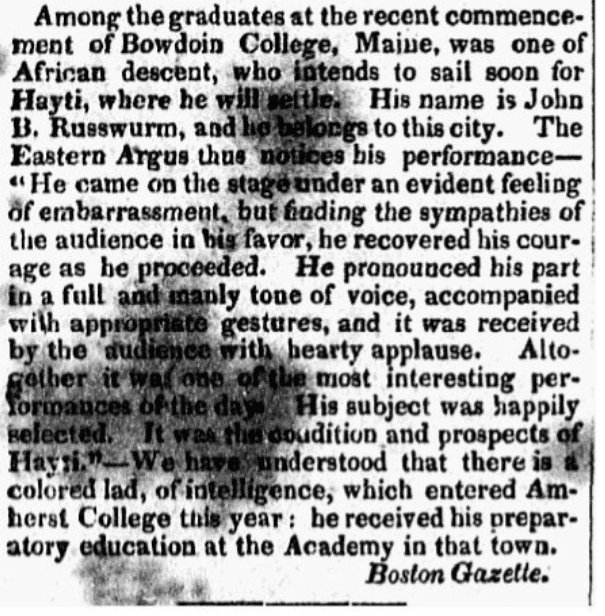
The First African American Owner and Publisher of an American Newspaper
Along with Samuel Cornish, Russwurm founded and published the first African American newspaper in America, launching the abolitionist newspaper Freedom’s Journal on 16 March 1827.
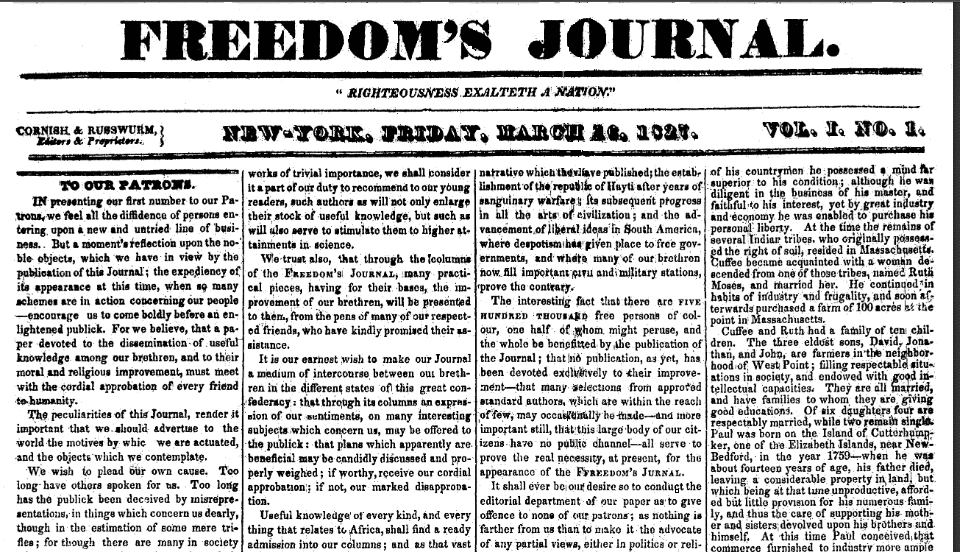
This pioneering newspaper uses the slogan “Righteousness Exalteth a Nation.”

So, what was reported in this historic publication?
The opening paragraph speaks of moral and religious improvement, as well as the dissemination of useful knowledge.
“IN presenting our first number to our Patrons, we feel all the diffidence of persons entering upon a new and untried line of business. But a moment’s reflection upon the noble objects, which we have in view by the publication of this Journal; the expediency of its appearance at this time, when so many schemes are in action concerning our people – encourage us to come boldly before an enlightened publick. For we believe, that a paper devoted to the dissemination of useful knowledge among our brethren, and to their moral and religious improvement, must meet with the cordial approbation of every friend to humanity.”
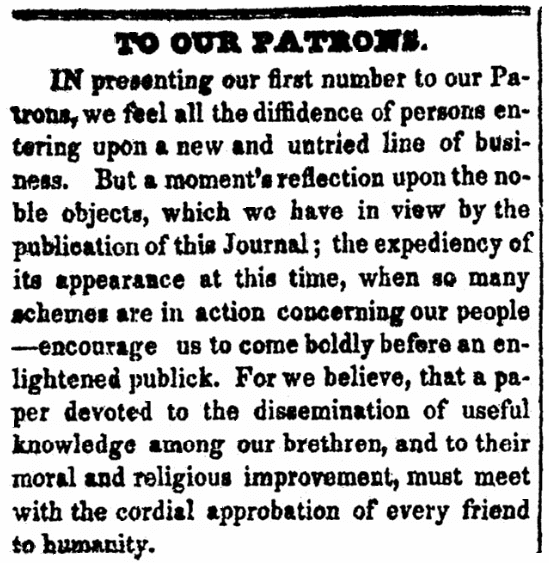
This Maine newspaper praises the publication of Freedom’s Journal, and says of its abolitionist message:
“We hope it will be felt as such by every citizen of the Republic.”
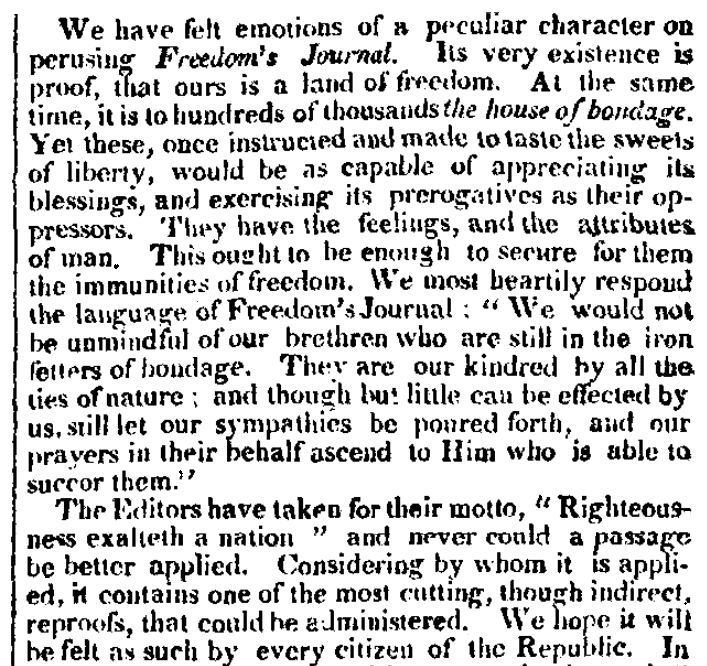
This Massachusetts newspaper reports a toast to Freedom’s Journal.
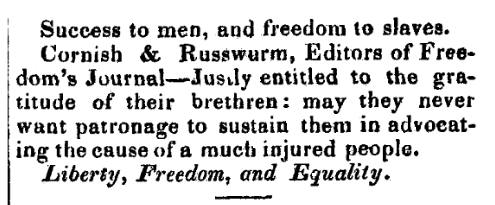
The American Colonization Society
There is so much to read about the American Colonization Society (a movement to relocate blacks from American to Africa) that I will not repeat the controversial history, only to say that Russwurm was at the heart of it – and he supported relocation, moving to Africa himself in 1829.
After moving to Liberia, Russwurm became the colonial secretary for the Society from 1830 to 1834, and later became superintendent of education for Monrovia, the capital of Liberia. In 1836 he became governor of a colony in African that later became part of Liberia.
Russwurm wrote many letters during his time in Africa. Some of his letters were published in American newspapers, including ones asking for financial help and others describing the conditions he found.
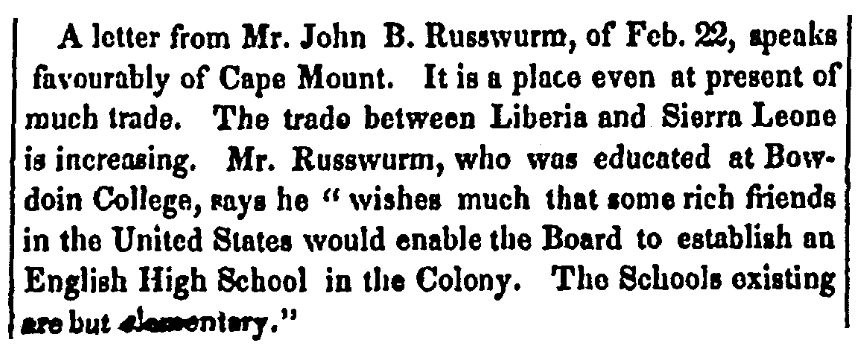
When Did He Die?
Wikipedia has a question mark for his death date. Did a man of such prominence as Russwurm really not have a published death notice? After about 30 seconds of searching, I located his death notice in GenealogyBank’s Historical Newspaper Archives.
On 29 October 1851 the Congregational Journal described Russwurm as the “indefatigable Chief Magistrate of Cape Palmas,” and clearly stated his death date as the 17th of June 1851.
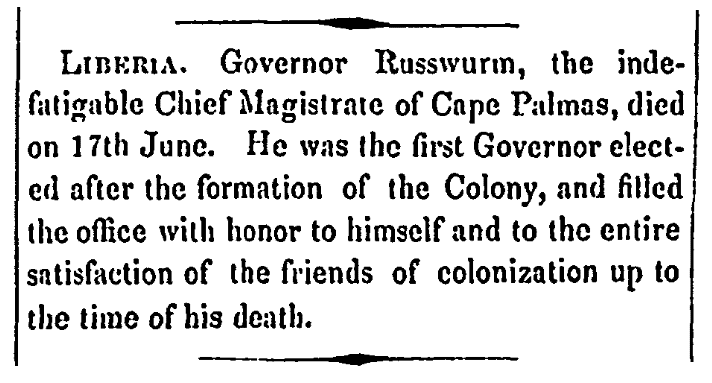
So, Is That All There Is to His Story?
Of course not – so if this article has intrigued you, let it be the inspiration for your own research, or to do an act of genealogical kindness, and find and document more information about John Brown Russwurm.
See:
- Bowdoin College’s Russwurm African American Center
- His father’s grave at Portland’s Eastern Cemetery could use a photo: https://www.findagrave.com/memorial/101709444/john-russwurm
Related Articles:
- African American Slave Trade: Ships & Records for Genealogy (Infographic)
- On This Day: Free Blacks Left U.S. to Form New African Colony
- ‘Freedom’s Journal’: The 1st African American Newspaper Published in America

A common mistake is the unfounded assumption of John Brown Russwurm’s father’s ethnicity being English. His father was a British subject in the Colonies, but his ancestry, even though somewhat obscured, is definitely not English from the namegiving ancestor.
The ancestors of the father were of German stock, as already the Southern German name Russwurm, Russworm and Rußwurm clearly suggests. Britain has always had a steady influx of German immigrants. As an example, have a look at George Frederick Koehler who invented and built a novel gun-carriage for the cannons which enabled the British military in Gibraltar to use their cannons in a shooting angle never before possible, thus enabling Britain to successfully defend Gibraltar against Spain.
There has never been such an Anglo-Saxon name as Russwurm, nor of Scandinavian, Flemish, Norman French or Celtic roots. Quite the opposite; that family name is still alive in today’s Germany. There is even an ancient titled Franconian family of that name. Not only in war troubled times like the Thirty Years War, Germans fled or emigrated from their native lands, and not rarely a subject of a German duke found his way ending up in Britain or Britain’s colonies as sought-after craftsman or through service in the armed forces of the British Empire. A good example for the latter group are the Hessian troops, having been hired-out to a foreign empire as war chattel-for-money by their own royalty whose lavish lifestyle had gotten a bit too expensive.
Quite a few Germans emigrated to Britain and became subjects of the Crown, just to be sent overseas into the colonies later; sometimes, it was not themselves but their Britain born sons who (were) relocated to the Colonies. For comparison, have a look at the so-called Anglo-Indians.